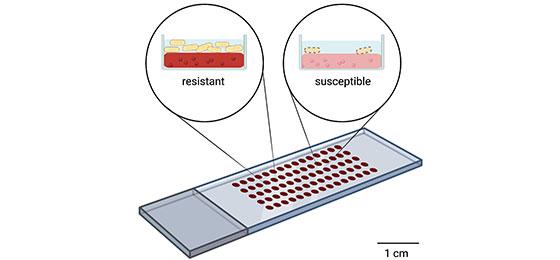Smaller means faster: diagnostics on a microchip

A miniaturized method that works with tiny amounts of bacteria could greatly speed up the diagnosis of antibiotic resistance.
Portrait / project description (completed research project)
No need to replicate pathogens
It currently takes hours or even days to determine whether a germ is resistant to an antibiotic. That's often too long when doctors need to take decisions about treatments. The most time-consuming element of current diagnostic procedures is replicating pathogens from the samples taken. New approaches therefore aim for accurate results with far fewer bacteria. Petra Dittrich's team at ETH Zurich has now developed a method in an NRP 72 project in which minute quantities of bacteria are fixed and analysed on a microchip. This omits the need for the replication step, so that results are available after just 2.5 hours.
The microchip has hundreds of tiny compartments filled with nanoparticle oxygen sensors and antibiotics. Bacteria in fluid are transferred to the chip's compartments using a pipette. The compartments are then sealed with an airtight transparent film. Bacteria sensitive to the antibiotic used subsequently die while any that are resistant survive. Survival can be determined microscopically from the oxygen consumption of the bacteria. In trials using different bacterial species, the differences between sensitive and resistant bacteria were apparent after approximately 1.5 hours; the researchers obtained reliable results after approximately 2.5 hours. These times varied depending on bacterial species.
Observing real processes
Petra Dittrich and her team also developed a variant of their microchips which enables the fluid and bacteria to be filled into the compartments first and an antibiotic to be added at a later point. This is useful for research purposes as it allows scientists to study what actually happens when medication is taken. Among other things, it enables simulation of variations in concentration and microscopic monitoring of their effect on bacterial proliferation. This can provide important information on the development of resistance.
The researchers have demonstrated in their project that microchip-based methods would be suitable in principle for rapid diagnosis of antibiotic resistance. As all instruments required are small, this approach is highly promising for point-of-care diagnostics, for example in doctors' practices, particularly in areas with less well developed infrastructure where there are no large diagnostic laboratories. Petra Dittrich and her team are now developing the technology further within the National Centre of Competence in Research NCCR AntiResist.
September 2021
Original title
Microfluidic device for ultrarapid phenotypic susceptibility testing of pathogenic microbes
